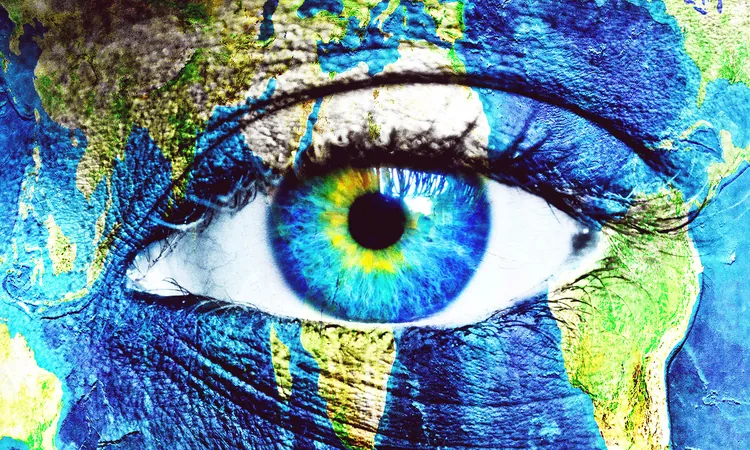
What Animal Could Replace Humans as Earth's Dominant Species? A Scientist's Surprising Theory!
2025-01-03
Author: Lok
The future of life on Earth without humans poses a fascinating question that has intrigued scientists and philosophers alike.
Our species, having spread across the globe, has drastically transformed ecosystems, climates, and biodiversity. However, history tells us that no species lasts forever. This realization not only evokes a sense of loss but also piques our curiosity about what life might look like in our absence.
A New Era After Humanity
Professor Tim Coulson from the University of Oxford, renowned for his work in biology and evolution, explores the potential successors to humanity in his enlightening book, The Universal History of Us. He delves into the mechanisms of evolution and highlights the inevitable reality that various species, including humans, are bound to face extinction eventually, regardless of their success.
Coulson emphasizes that while most genetic mutations may be detrimental, a few contribute to adaptability and reproductive success. This natural selection can lead to the emergence of entirely new forms of life when humanity disappears.
Who Might Take Our Place?
Once humans are out of the equation, it's conceivable that Earth's ecosystems could rediscover balance, paving the way for new species to rise. Although many speculate that primates might fill the void, Coulson presents a more unconventional contender: the octopus. These intelligent and resourceful creatures boast problem-solving skills and complex communication abilities, hinting at the potential for a civilization to emerge among them.
Coulson notes that octopuses, with their decentralized nervous systems and adaptable nature, could thrive in a world reshaped by significant ecological changes. He shares fascinating anecdotes about their creativity, such as their notorious escapes from aquariums, tool use, and curiosity-driven behaviors.
The Underwater Empire of the Future
However, Coulson points out a significant challenge for octopuses: their anatomical limitations. Primarily aquatic, their evolution would depend on drastic adaptations for terrestrial life. With continued evolutionary changes, it's plausible that they might one day develop ways to breathe outside water and explore the land for survival.
Imagine a world where octopuses create intricate underwater colonies or pioneer new technologies to interact with terrestrial life. Would they design underwater cities or come ashore, armored in breathing gear, ready to hunt? Such scenarios spark the imagination about Earth's future without human influence.
The Nature of Evolution and What Lies Ahead
Coulson stresses that predicting the trajectory of evolution is inherently uncertain. The paths life may take are influenced by countless variables, including random mutations and catastrophic events that could reshape biological diversity. The notion of octopuses becoming the new apex species intrigues as it emphasizes the unpredictable nature of evolution.
While Coulson does not claim this scenario is a certainty, he encourages us to consider how nature might reorganize itself in our absence. After all, history is rich with instances of life flourishing after mass extinctions.
A Thought-Provoking Experiment
Thinking about a world without humans challenges us to appreciate the fragile position we hold on this planet. Our existence is just a chapter in the grand story of life on Earth, which continues to evolve and adapt through time.
As we ponder the potential successors to humanity, the crucial takeaway is the importance of humility and respect for the interconnected ecosystem we inhabit. The future may hold surprises beyond our wildest imaginations, from the depths of the ocean to the vast expanse of the land.
What Do You Think?
Could Octopuses Become the Brains of the Sea? Join the Conversation!



 Brasil (PT)
Brasil (PT)
 Canada (EN)
Canada (EN)
 Chile (ES)
Chile (ES)
 Česko (CS)
Česko (CS)
 대한민국 (KO)
대한민국 (KO)
 España (ES)
España (ES)
 France (FR)
France (FR)
 Hong Kong (EN)
Hong Kong (EN)
 Italia (IT)
Italia (IT)
 日本 (JA)
日本 (JA)
 Magyarország (HU)
Magyarország (HU)
 Norge (NO)
Norge (NO)
 Polska (PL)
Polska (PL)
 Schweiz (DE)
Schweiz (DE)
 Singapore (EN)
Singapore (EN)
 Sverige (SV)
Sverige (SV)
 Suomi (FI)
Suomi (FI)
 Türkiye (TR)
Türkiye (TR)
 الإمارات العربية المتحدة (AR)
الإمارات العربية المتحدة (AR)